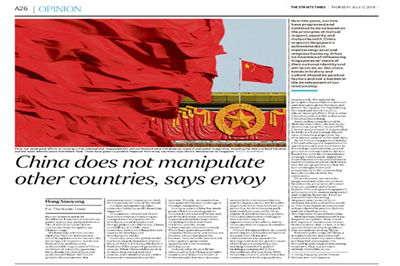Ambassador Hong Xiaoyong publishes a signed article in The Straits Times to respond to remarks that distort China's image
On July 1st 2018, The Straits Times published the speech made by Mr Bilahari Kausikan, the former Permanent Secretary of the Ministry of Foreign Affairs of Singapore, at a forum on public diplomacy. He made groundless attack at China, claiming that China is conducting influence operation through persuasion, inducement and coercion.
In response, H.E. Mr. Hong Xiaoyong, Chinese Ambassador to Singapore, had a signed article published in The Straits Times on July 12th. In the article, he responded to Bilahari's speech in order to set the record straight. The full text is as follows:

Recent remarks made by Mr Bilahari Kausikan at a forum on public diplomacy and published in The Straits Times have led to comments from the public on China's image.
Mr Kausikan, a former senior diplomat, has not infrequently aired his opinions in the media. His latest speech, however, is a far cry from reality and leaves an unfavourable impression of China on others. It raises the question: How should the world view and understand China? As China's global influence grows, this assumes greater importance, both for China and the rest of the world.
Is China manipulating other countries' citizens, as Mr Kausikan suggests?
In response, I would say firstly that every country hopes to gain recognition and support for its development philosophy and foreign policies. In this sense, China is no different. Unlike some countries, however, China does not impose its ideology and development model.
Secondly, since the global media has been largely dominated by the West, in fact, it is China which often finds itself the target of groundless attacks. What China wishes to do is to share its propositions in a modest and candid manner, rather than seek to manipulate public opinion. Thirdly, no country has ever gained influence and respect through manipulation.
In recent years, China has made great efforts in carrying out its international responsibilities and put forward some initiatives on regional and global cooperation, including the Belt and Road Initiative and the Asian Infrastructure Investment Bank. These have gained a positive response from many countries, not because of manipulation but because they meet the interests of other parties and provide opportunities for common development.
Indeed, what the world has witnessed is that China, a socialist country and home to almost 1.4 billion people, has risen in a way unseen before in human history, and the impact on the world is also unprecedented. Its achievements prove that its development path and model are successful. As an engine of global economic growth, China has always been willing to share its development opportunities with others, but by no means does it impose its models on others.
China's foreign policies are aimed at serving its national development. Beyond that, China also endeavours to incorporate its development into the greater cause of world peace and prosperity, working towards the goal of building a community with a shared future for mankind. With these objectives in mind, China has implemented its foreign policies consistently, upholds the principles of peaceful co-existence and champions global fairness and justice. We oppose the big bullying the small and interference in others' internal affairs. This is what China has said and this is also what China has been doing.
Some online remarks cited by Mr Kausikan in his criticism by no means represent the stance of the Chinese government. It is a pity that he looks at China through biased eyes. Given his perspective, his conclusions cannot be fair and right.
As for China-Singapore relations, China attaches great importance to our bilateral ties and cherishes the friendship established by several generations of our leaders. Mr Lee Kuan Yew, with his extraordinary strategic vision, made important contributions to the establishment and development of our diplomatic ties. We are pleased to see that Mr Lee's strategic vision and commitment to the relationship have been inherited by his successors.
Over the years, our ties have progressed and continue to do so based on the principles of mutual respect, equality and mutual benefit. China respects Singapore's achievements in maintaining racial and religious harmony. It has no intention of influencing Singaporeans' sense of their national identity and will never do so. Our close bonds in history and culture should be positive factors and not a burden in the development of our relationship.
Mr Kausikan condemned China for presenting false choices and forcing other countries to choose between them. But, in fact, it is his speech that is misleading others into misunderstanding China.
Distorting the image of China, a key player in the international community, not only causes harm to China but also impairs the friendship and cooperation among countries. That is a scenario nobody would like to see.